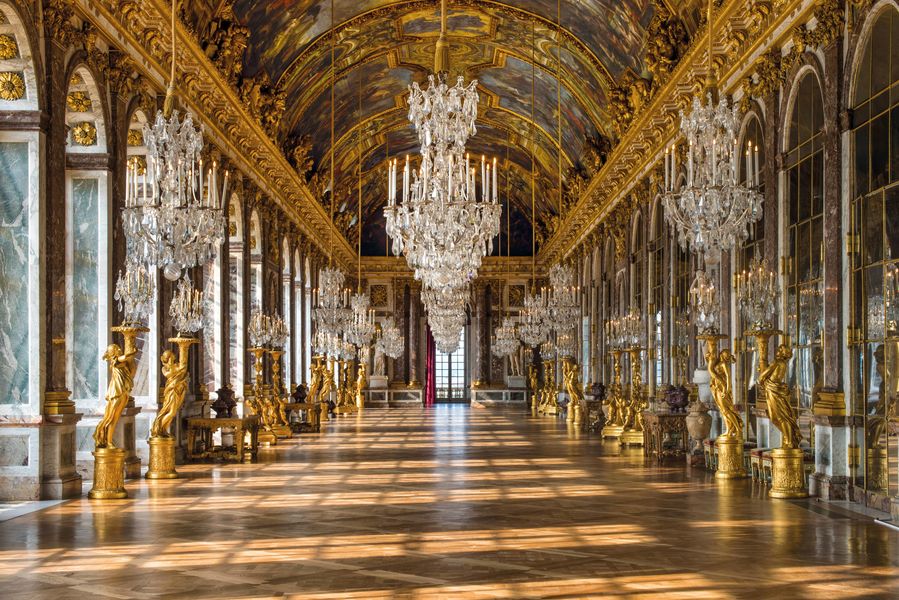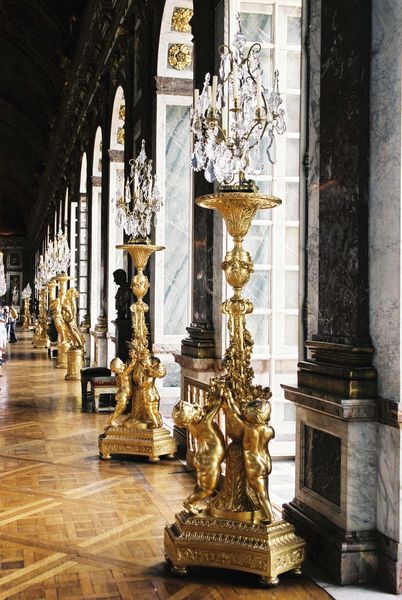The Hall of Mirrors
Economic prosperity is revealed in the number and size of the 357 mirrors bedecking the 17 arches opposite the windows, demonstrating that the new French manufacture could rival the Venetian monopoly on mirror manufacturing.
The Hall of Mirrors, the most famous room in the Palace, was built to replace a large terrace designed by the architect Louis Le Vau, which opened onto the garden. The terrace originally stood between the King’s Apartments to the north and the Queen’s to the south, but was awkward and above all exposed to bad weather, and it was not long before the decision was made to demolish it. Le Vau’s successor, Jules Hardouin-Mansart, produced a more suitable design that replaced the terrace with a large gallery. Work started in 1678 and ended in 1684.
Following on from the victory over the three united powers, depicted in the War Room, the whole length of the Hall of Mirrors (73m) pays tribute to the political, economic and artistic success of France. Political successes are illustrated through the 30 painted compositions on the vaulted ceiling by Le Brun, which depict the glorious history of Louis XIV during the first 18 years of his reign, from 1661 to the peace treaties of Nijmegen. Military and diplomatic victories and reforms with a view to reorganising the kingdom are illustrated through allegories from Antiquity. Economic prosperity is revealed in the number and size of the 357 mirrors bedecking the 17 arches opposite the windows, demonstrating that the new French manufacture could rival the Venetian monopoly on mirror manufacturing. At the time such items were a great luxury. Artistic success is shown by the Rouge de Rance pilasters topped with capitals of gilded bronze based on a new design, which was referred to as “the French style” and was created by Le Brun upon the request of Colbert. The design incorporates the national emblems, with a fleur-de-lis topped by a royal sun between two Gallic roosters (the Latin word for rooster was gallus).
Courtiers and visitors crossed the Hall of Mirrors daily, and it also served as a place for waiting and meeting. It was used for ceremonies on rare occasions, for example when sovereigns wanted an extra dash of lavishness for entertainment (balls or games) held for royal weddings or diplomatic receptions. During the latter events, the throne was placed on a platform at the end of the hall near the Peace Room, whose arch was closed off. Rarely has the show of power reached such a level of ostentation. In 1685 the Doge of Genoa and the ambassadors of Siam (1686), Persia (1715) and the Ottoman Empire (1742) crossed the full length of the gallery, under the scutiny of the French Court seated to either side on tiered seating, before they reached the king.
It was also here that the Treaty of Versailles was signed on 28 June 1919, ending the First World War. Since then, presidents of the Republic have continued to receive official guests here.
General information
Openings
Open every day except on Monday.
Closed exceptionally on January 1st, May 1st and December 25th.
During high season: from 9:00 to 6:30 p.m. (last entry at 6:00 p.m.) from Tuesday to Sunday except for certain holidays or official ceremonies.
During low season: from 9:00 to 5:30 p.m. (no admission after 5:00 p.m.) from Tuesday to Sunday except for certain holidays or official ceremonies.
Fares
Adult: 21 €.
Free entry for children < 26 years, children accompanied by an adult, teachers, people with reduced mobility, disabled people, disabled people and accompanying persons.
Group rate available for > 30 people.
Free for people under 26 years old from European Union
Free for people under 18 years outide of the European Union
Free for disabled person and an accompanying person
Tickets available :
- Palace ticket
- The 1 day pass includes the entire estate (Palace + Gardens + Trianons)
- The 2 days pass includes the entire estate (Palace + Gardens + Trianons) for two consecutive days.
Free the first Sundays of each months from November to March).
![]()
![]()
![]()
![]()
![]()
Visits
Features
- Toilets
- Parking nearby
- Coach access
- Tourist brochures
- Tourist information
- Guided tours

